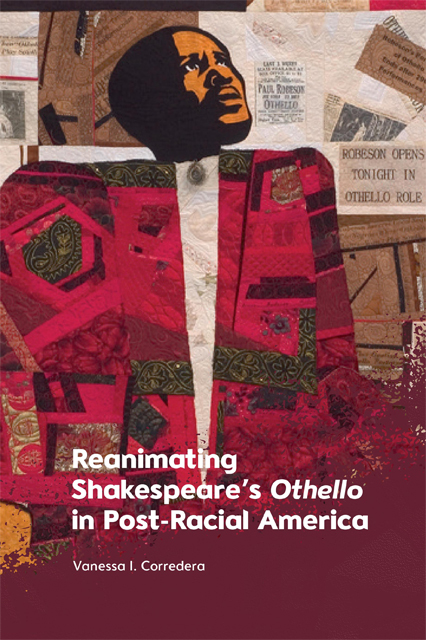Book contents
- Frontmatter
- Contents
- Acknowledgments
- Permissions
- Introduction
- 1 Images of Objectification: Othello as Prop in Kill Shakespeare
- 2 Colorblindness on the Post-Racial Stage: Hip Hop, Comedy, and Cultural Appropriation in Othello: The Remix
- 3 Othello, Race, and Serial: The Ethics of a Shakespearean Cameo
- 4 “No tools with which to hear”: Adaptive Re-Vision, Audience Education, and American Moor
- 5 At the Intersection of Gender, Race, and White Privilege: A Case of Three Desdemona Plays
- 6 Resisting Lobotomized Shakespeare: Whiteness and Universality in Key & Peele and Get Out
- Epilogue
- Bibliography
- Index
6 - Resisting Lobotomized Shakespeare: Whiteness and Universality in Key & Peele and Get Out
Published online by Cambridge University Press: 25 October 2023
- Frontmatter
- Contents
- Acknowledgments
- Permissions
- Introduction
- 1 Images of Objectification: Othello as Prop in Kill Shakespeare
- 2 Colorblindness on the Post-Racial Stage: Hip Hop, Comedy, and Cultural Appropriation in Othello: The Remix
- 3 Othello, Race, and Serial: The Ethics of a Shakespearean Cameo
- 4 “No tools with which to hear”: Adaptive Re-Vision, Audience Education, and American Moor
- 5 At the Intersection of Gender, Race, and White Privilege: A Case of Three Desdemona Plays
- 6 Resisting Lobotomized Shakespeare: Whiteness and Universality in Key & Peele and Get Out
- Epilogue
- Bibliography
- Index
Summary
A criticism that needs to insist that literature is not only “universal” but also “race-free” risks lobotomizing that literature, and diminishes both the art and the artist.
—Toni Morrison, Playing in the Dark (12)The Allure of Universal Shakespeare
On April 27, 2016, actor David Tennant appeared on The Late Show with Stephen Colbert for an interview during which Colbert inquired, “Why do you think Shakespeare is still so resonant to us today?” Tennant observed that Shakespeare speaks to a “universal human condition.” Similar language characterized a range of 2016 promotional materials for celebrations of the 400th anniversary of the Bard’s death, with words and phrases like “lasting legacy,” “relevance,” “timeless,” and “international appeal” recurring. Shakespeare Lives, sponsored by the British Council, was a series of events and activities marketed as “exploring Shakespeare as a living writer who still speaks for all people and nations.” The Shakespeare Theatre Association “chronicl[ed] celebrations of Shakespeare’s life, work and universal appeal” through performances and readings. And in an article on the quatercentenary celebrations in The Independent, Clarisse Loughrey similarly asserts, “his influence pervades so much in our lives, because his work has become so timeless in its ability to touch upon human nature.” These are, essentially, claims for a universal Shakespeare.
Appeals to Shakespeare’s universality are not solely the provenance of late-night repartee or celebratory promotions. Harold Bloom famously credits Shakespeare with inventing personality and claims that Shakespeare is “a more adequate representer of the universe of fact than anyone else” (16). Kiernan Ryan has more recently considered Shakespeare’s universal appeal. He argues that problems with claims to universality lie with “the conservative construction” (7), which fails to account for Shakespeare’s use “to make class society, patriarchy, racial divisions and colonial domination vanish behind the smokescreen of the eternal human predicament his drama allegedly reflects” (4). Instead, Ryan calls for attention to what he terms Shakespeare’s “universal human potential” (9). Shakespeare’s plays, Ryan asserts, communicate “the potential of human beings, then and now, to base their lives together on values that possess universal validity, because they are founded on the simple, irrefutable fact that we belong to the same species” (10).
- Type
- Chapter
- Information
- Reanimating Shakespeare's Othello in Post-Racial America , pp. 253 - 298Publisher: Edinburgh University PressPrint publication year: 2022



